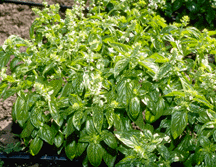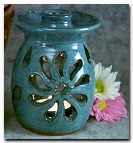Frequently Asked Questions
1. What is aromatherapy about?
Aromatherapy is the therapeutic use of aromatic substances. This holistic treatment is usually combined with body-contact in the form of a massage. However, it is possible to receive results from inhaling the vapor of these substances as well.
2. How do I start using aromatherapy?
Before you begin practicing aromatherapy or using it as a treatment, the first thing you should do is READ! Try to get as much information as possible on the different types of essential oils and which ones are best suited for your desired goal. Then, go to someone who is educated about essential oils and try about 3 or 4 of the ones you have read about. Soon you will be able to expand your usage of essential oils and develop more ways practicing aromatherapy.
3. What are essential oils?
Essential oils are subtle, volatile liquids that are distilled from trees, plants, flowers, shrubs, bushes, and seeds.

Basil is an excellent essential oil source.
These oils are known for their incredible healing powers and have long been the life-blood of the plant kingdom. Properties of essential oils include: immune stimulating, anti viral, anti bacterial, anti microbial, antiseptic, anti fungal, and anti parasitic.
4. Where can I find these essential oils?
Essential oils may be purchased almost anywhere. Common places where you may find them include:
* Pharmacies
* Health Food Shops
* Cosmetic Shops
* Supermarkets
* Aromatherapy Stores
* Internet Shopping
* Craft Fairs
* Garden Centers
5. How do I know if I have a good essential oil?
Oils should be in dark blue or brown bottles and should have a label stating “essential oil” rather than fragrance oil, perfume oil, room scent, or massage oil. They should also show the Latin name of the oil and its country of origin. Your oil should be pure and unblended.

Lavender Oil
6. How do I use my essential oils?
There are several ways to use these oils, but if you are just getting started, you should purchase a ceramic oil burner that will allow you to fill your room with the pleasant scent. You can do this by filling the ceramic dish with a little water and 2 to 3 drops of your selected oil. Then, place a safety candle beneath the dish. If your room is large, you may need to add more drops. Remember DO NOT leave the candle unattended.

Essential Oil Diffuser
Other ways to use essential oils are:
* In an oil burner / candle burner / electric vaporizer
* On a ceramic electric light bulb ring
* Placing a few drops on a tissue near where you sleep
* In a massage oil
* In the bath
* In a foot bath
* In cosmetic/cleaning products
* In candle wax
* Steam inhalation
* Mouth gargles
*Note* It is not recommended that you take oils internally as there are potential risks.
7. Can I use essential oils undiluted?
Using these oils without diluting them is not wise unless you have a bottle of lavender. All essential oils should really be diluted in carrier oil before being applied to the body. The recommended dilution strength for massage is 1 drop of essential oil per 2ml of carrier oil. Essential oils are very potent, so taking appropriate measures should reduce entry of these oils in the bloodstream. Potency depends on strength, volume and the amount of time between applications or exposure.
8. What is a carrier oil?
Carrier oils also referred to as base oils or vegetable oils are used to dilute essential oils, CO2s and absolutes before applying to the skin. They “carry” the essential oil onto the skin. Different carrier oils offer different properties and the choice of the carrier depends on the therapeutic benefit being sought. Carrier oils are generally clod-pressed vegetable oils derived from the fatty portions of plants. Unlike essential oils, carrier oils don’t evaporate or impart strong aromas. Some commonly used carrier oils are Grapeseed, Sweet Almond and Wheatgerm.

Carrier Oils
9. Does aromatherapy work for treating serious illnesses?
There is some evidence that suggests essential oils can help serious illnesses. For those who have been diagnosed with a serious illness and have tried conventional treatments with no success, aromatherapy may be an option. However, it is important to seek medical advice from a doctor first. Note that aromatherapy is not a substitute for modern medicine, despite its natural healing powers. Aromatherapy treatments have proved to be moderately effective in treating everyday ailments and infections, but there is no evidence that they prolong life expectancy to any degree.
10. Is there any evidence that aromatherpay does any good at all?
Research has been conducted to determine the effectiveness of some essential oils especially the popular ones such as tea tree, peppermint and lavender. The antibacterial and antiviral properties of these oils are now well regarded. In fact, many of these essential oils are now finding their way into various cosmetic and cleaning products. “Lemon and “pine” fresh cleaners, “tea tree” shower gel and shampoo, and “rosemary” bath oil are all examples of how people have accepted the power these oils on healing and providing relief.



